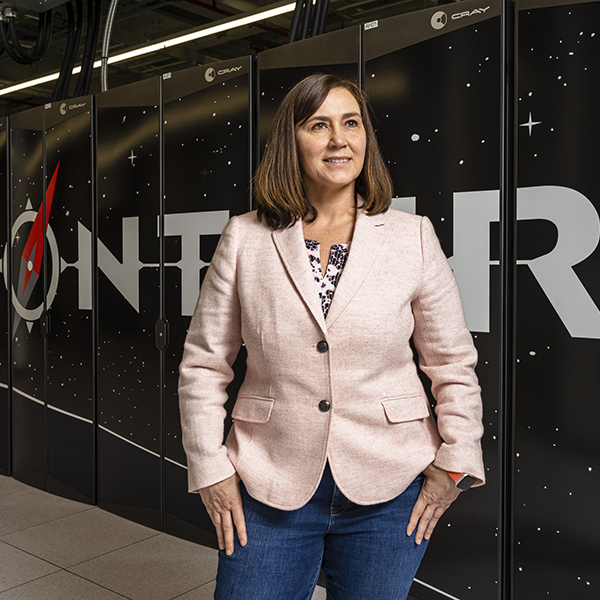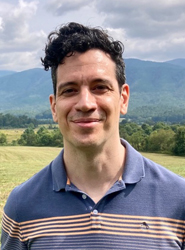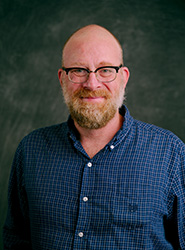Former English Major Flourishes as Section Head for Operations at the Oak Ridge Leadership Computing Facility

Ashley Barker (’96) is the Section Head for Operations at the Oak Ridge Leadership Computing Facility (OLCF) located at Oak Ridge National Lab (ORNL). After graduating from UT English with a literature concentration, she went on to receive a Master of Science degree in Information Sciences, also from UT. She spoke with Prof. Hilary Havens about how her work with the world’s fastest supercomputer proves that English majors don’t have limits. This interview has been edited for length and clarity.
Hilary Havens: Could you tell me about your current work at Oak Ridge?
Ashley Barker: I work in the National Center for Computational Sciences. Our mission is to provide the computational power of the world’s fastest supercomputers to international science campaigns. We run open competitions where scientists submit research proposals to gain access to our systems. A panel evaluates these proposals to determine the most meritorious projects. My group is in the operations area, and we help the selected users get on the system and ensure that they have what they need to efficiently use it.
Our systems operate 24/7, and every hour of downtime results in a significant waste of resources. We work hard to ensure users can maximize their system usage because every hour without usage means wasted resources and taxpayer money. Our systems consume a significant amount of power, cooling, and water, so we take our responsibility seriously. We aim to help users achieve their science goals for the greater good of our world. It’s exciting to know that as someone with an English background who is outside of computer science, I can contribute to improving our world in this way.
HH: You mentioned the computer runs 24/7. Does that mean projects run at 3 in the morning?
AB: We have what’s called a batch system. Users submit jobs, and a scheduler assigns resources to these jobs. The scheduler aims to keep the system running at nearly full capacity. It’s similar to playing Tetris, where the scheduler tries to fit jobs into available resources efficiently. The rules basically say that some projects, which are ranked in different tiers, have higher priority. You can also have higher priority if you haven’t submitted a job in a while someone else has recently submitted 10 jobs. In that case, it’s your turn to get your share of it.
My team also supports the users, and we get to talk about the results. As achievements happen, as publications occur, and as breakthroughs happen, my team is responsible for communicating those via print, website, and social media. We are also responsible for communicating with our stakeholders. We’re like a university funded by the public, ensuring that the public and our stakeholders, like the Department of Energy, understand the value of what they’re getting from these resources.
We are also responsible for the development of the software tools we use in-house. We create various tools and gather reports on how many users we have, how many projects we have, and how much time each project uses. Additionally, we have a group responsible for acceptance testing of these systems, which is a quality assurance process that determines to what degree an application meets the contractual obligations. Right now, we’re working on our next system, which takes about a five-year period from start to the time it’s actually turned on and made available to users because of the many necessary years of research, development, and manufacturing. There’s a lot of pressure to determine if a system is ready or not because everyone wants access to the system. But we also don’t want to say it’s ready prematurely because that’s when we pay the vendor, and we don’t want to do this if the system doesn’t meet the requirements. So there’s always this tension when a system comes in.
HH: I love this! How did you get to be a project manager at Oak Ridge? Did you always want to be one?
AB: No, I have the craziest story. I moved to Knoxville from Memphis, and I was paying for my own schooling. I had always worked with kids growing up and knew I wanted to be a teacher. So, I majored in English thinking I would go into teaching. At the time, not everyone had their own computers, and I had to use the computer lab to write papers. As an English major, I was writing papers every day. I would go to the computer lab, sign out a computer, and work there. I noticed people sitting at the tables that handed out keys to the computers and changed the paper. Most of the time, they were doing their homework, and I thought, “That’s the job I need.” So I applied for the job.
I asked the person at the desk if they were hiring, and they said yes and told me where to apply. When I walked up, she asked, “Are you here for the job?” I said, “Yes, I am.” She said, “Okay, great, I’m free now. Can I just go ahead and interview you now?” I said, “Yes,” and she called me that night to say I got the job. I went in the next day and asked, “So when do I start working in a lab?” She said, “What do you mean working in a lab? That’s down the hallway.” I applied for the wrong job, but it was the best mistake I’ve ever made in my life. Because I ended up working in what was called the networking group, which was right when the Internet was exploding. We didn’t have Internet on the campus, and everyone wanted this World Wide Web thing. So we were the ones who came in, ran the cables, connected the network, and installed Ethernet cards in computers. Computers at that time didn’t come with them. Within a few months, I went from being the copy-staple-file girl to helping with the coordination of these installations.
Over the course of a few years, I ended up in a leadership role. People would call to get someone scheduled to go to the office, and I helped to coordinate the work and make sure they got billed properly. As a student, I was working more than 40 hours a week, which is the only way I made it through school. It was new, it was exciting, and I started to learn about computing and networking, and the bottom line is, after I graduated, my boss asked, “Would you like a full-time job?” I couldn’t find a job in teaching English in the area, and I wanted to stay. We merged with the central computing: I started running the help desk and a lot of the student IT services. Then a few folks moved to ORNL and contacted me about a job, and I replied, “I know a whole lot about IT. I know very little about high-performance computing, but I’d like to learn.” And lucky for me they took a chance and gave me an opportunity.
I was hired at Oak Ridge to be the group leader of the user assistance and outreach team, and as years passed, we expanded and took on new responsibilities. A few years ago, the lab created new Section Head positions, so I am now Section Head with four direct reports who are responsible for the different teams that make up my Section. I’m also serving as the deputy director for the Exascale project. I’ve never in my career had limits. I’ve never had people say, “Well, that’s not your background,” or “You don’t know about that.” Instead, I’ve gotten, “Sure, if you can help, learn.” I’ve never worked for people who put me in a box because I have an English degree. I haven’t run into any barriers because of that.
HH: That is excellent. I teach Digital Humanities in my classes, and my students pick up coding and digital tools really quickly. English majors can do anything and shouldn’t be put in a box. How did your studies as an English major help you on this career path? Are there other skills that you learned in English that have helped you succeed in your role at Oak Ridge?
AB: Yes, I do a lot of writing: proposals, documentation for our users, communicating with our stakeholders. Every day I write something. All that practice paid off, and I can just sit down and write, and I can get it out, whereas other people may struggle with it. People don’t understand how much writing you do in a job. I think communication is a key aspect in any position. If you can communicate well, people want you on their team and want you to be part of their project.
HH: Why should someone major in English today?
AB: It gives you a fundamental base on which you can grow. And your [alumni interview] series shows that you can take it in many different directions. Maybe you can’t go do every single job out there with an English major, but you can certainly do a lot of them. You have that experience where you have communication, you have collaboration. You have core writing, reading, and talking skills, which are central in many different positions.

